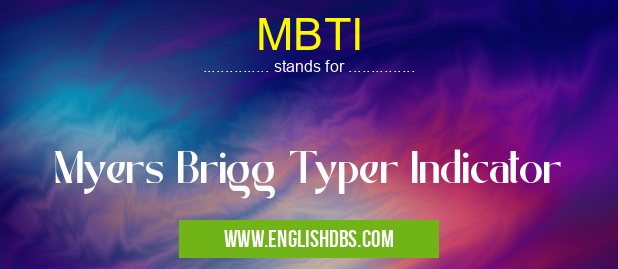What does MBTI mean in UNCLASSIFIED
MBTI (Myers-Briggs Type Indicator) is a widely used personality assessment tool developed by Isabel Briggs Myers and Katharine Cook Briggs. It is based on the theories of Carl Jung and categorizes individuals into 16 distinct personality types. The MBTI has gained significant popularity in various fields, including career counseling, team building, and personal growth.

MBTI meaning in Unclassified in Miscellaneous
MBTI mostly used in an acronym Unclassified in Category Miscellaneous that means Myers Brigg Typer Indicator
Shorthand: MBTI,
Full Form: Myers Brigg Typer Indicator
For more information of "Myers Brigg Typer Indicator", see the section below.
What does MBTI Stand for?
MBTI stands for Myers-Briggs Type Indicator. It is named after its creators, Isabel Briggs Myers and Katharine Cook Briggs.
MBTI Full Form
The full form of MBTI is Myers-Briggs Type Indicator.
How does MBTI work?
The MBTI assessment consists of a series of questions designed to identify an individual's preferences in four key areas:
- Extroversion (E) vs. Introversion (I): Focuses on where individuals draw their energy from.
- Sensing (S) vs. Intuition (N): Examines how individuals perceive information.
- Thinking (T) vs. Feeling (F): Explores how individuals make decisions.
- Judging (J) vs. Perceiving (P): Indicates how individuals prefer to live their lives.
Applications of MBTI
MBTI has numerous applications in various fields, including:
- Career Counseling: Helps individuals identify suitable career paths based on their personality traits.
- Team Building: Facilitates team development by fostering understanding and appreciation of diverse personalities.
- Personal Growth: Provides insights into an individual's strengths, weaknesses, and areas for improvement.
Essential Questions and Answers on Myers Brigg Typer Indicator in "MISCELLANEOUS»UNFILED"
What is the Myers-Briggs Type Indicator (MBTI)?
Developed by Isabel Myers and Katharine Cook Briggs, the MBTI is a personality inventory that assesses an individual's preferences across four dimensions: Extraversion vs. Introversion, Sensing vs. Intuition, Thinking vs. Feeling, and Judging vs. Perceiving. The results indicate a four-letter type, such as ISTJ or ESFP.
What are the benefits of taking the MBTI?
The MBTI can provide insights into personal strengths, weaknesses, and communication styles. It can be used for career counseling, team development, and self-improvement. By understanding one's type, individuals can better leverage their abilities and communicate effectively with others.
Is the MBTI scientifically valid?
The MBTI has been widely used and researched over the years, but its validity has been a subject of debate. While some studies have found correlations between MBTI types and certain behaviors or outcomes, others have questioned the reliability and validity of the instrument. It's important to note that the MBTI is not a diagnostic tool and should not be used for making major life decisions.
How can I interpret my MBTI results?
MBTI results provide a general overview of one's personality preferences, but they should not be taken as definitive. To fully understand your results, it's recommended to consult with a qualified professional who can help you explore the implications and applications of your type.
Are there any limitations to the MBTI?
The MBTI is a self-report inventory, which means that it relies on the individual's accurate and honest responses. Additionally, the MBTI may not be suitable for everyone, such as individuals with language barriers or cognitive impairments. It's important to use the MBTI as a tool for self-exploration and development, rather than as a strict label or predictor of behavior.
Final Words: MBTI is a well-known personality assessment tool that categorizes individuals into 16 distinct types based on their preferences in four key areas. It has proven valuable in career counseling, team building, and personal growth, helping individuals better understand themselves and others. However, it is essential to note that MBTI is not a definitive measure of personality and should be used as a tool for self-reflection and growth rather than as a label.
